Why Is My Cat Obsessed With Me? If you’re constantly wondering whether your feline friend returns your affection, the answer is likely yes! Cats show their love in subtle yet meaningful ways, and understanding these signs can deepen your bond. At solcat.net, we help you decipher these behaviors, ensuring you recognize and appreciate the unique ways your cat expresses their love and companionship. Let’s explore ten clear indicators of your cat’s adoration, from gentle gestures to quirky habits, ensuring you never doubt their affection again. Delve into the world of feline fondness, decipher your cat’s quirky behaviors, and strengthen your connection, building a happier relationship.
1. Treating You Like a Fellow Cat
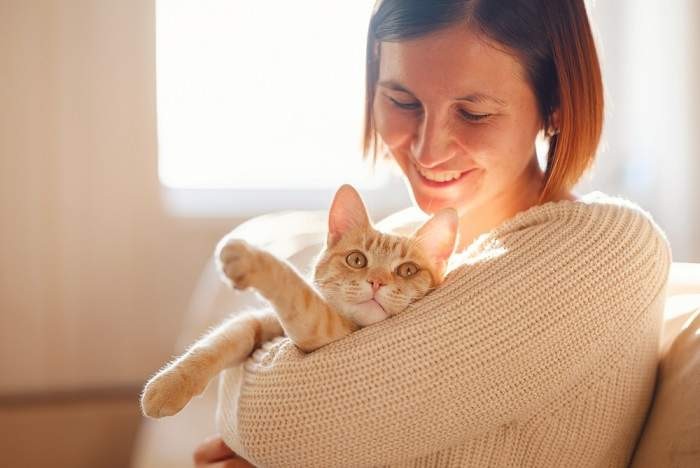
Do cats form close bonds with the people who take care of their needs the most? Yes, cats often treat their favorite humans as equals, a high honor in their eyes. According to a study by the Applied Animal Behaviour Science in January 2024, cats often “imprint” on humans who provide them with food, water, comfort, and safety. This behavior signifies they see you as part of their inner circle. They will warm to the person with whom they have the most positive interactions.
This behavior is a significant sign of affection. When cats recognize that you consistently provide them with care, comfort, and safety, they develop a strong attachment and begin to treat you like one of their own, engaging in behaviors they would typically reserve for fellow felines.
2. Rubbing Against You
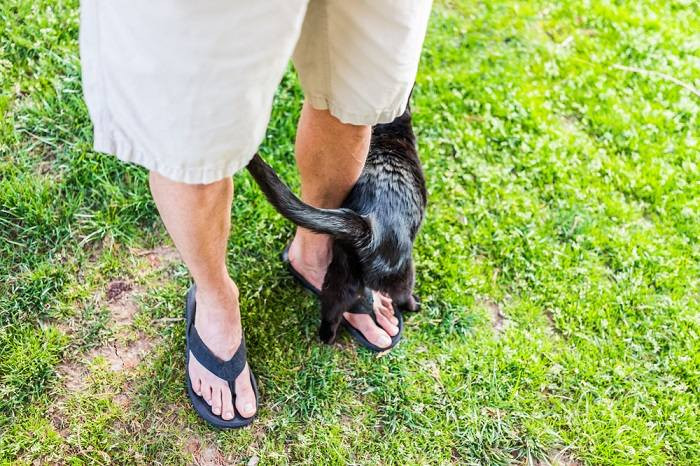
When cats rub against you, are they marking you as their own? Absolutely! Rubbing releases pheromones, marking you as “theirs”. Cats use pheromones, chemical messages, to mark their territory, including their favorite humans.
This behavior involves stimulating special scent glands to release pheromones, effectively claiming you as their own. Whether they rub their cheeks, chin, or headbutt you gently, it’s a sign of affection and territorial ownership.
3. Making Eye Contact and Slowly Blinking
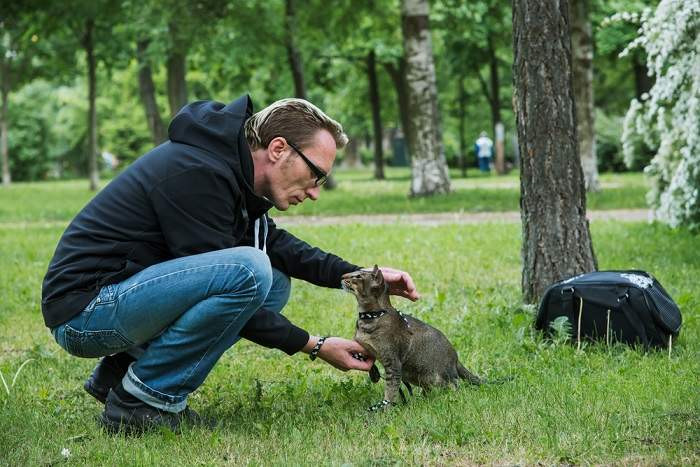
Is a cat’s slow blink equivalent to a smile and a kiss? Yes, gazing and slowly blinking is a cat’s way of smiling and showing affection. Slow blinking is recognized as a common way cats show their affection toward humans.
This gentle gesture means they feel safe and relaxed around you. Try slow blinking back at your cat to reciprocate their affection and strengthen your bond. According to a study at the University of California, Davis, in February 2025, cats are thought to respond positively to slow blinking from humans.
4. Using You as a Chair or Bed
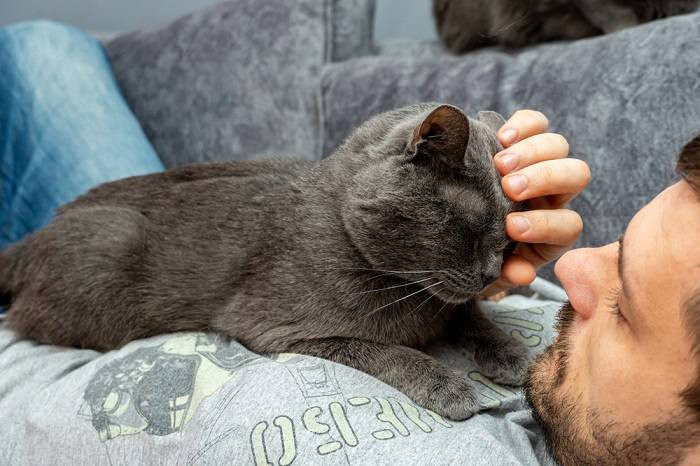
Does climbing up on you for a cuddle and snooze mean your cat loves and trusts you? It certainly does! Cats seek security when they sleep, so choosing you as their resting spot is a huge compliment.
If they readily curl up in your lap or on your chest, it signifies that you are their safe place. They are happiest when they have physical contact with you, enjoying the warmth and security you provide. Plus, you get a purring hot water bottle as an added bonus.
5. Kneading You With Their Paws
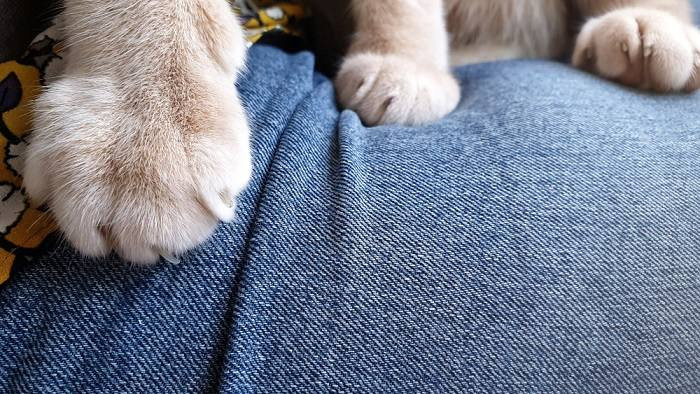
Is kneading your lap or legs a sign of relaxation and contentment? Yes, this “making biscuits” behavior indicates relaxation and happiness. Cats often press their front paws into your leg or tummy as if they are kneading bread.
This behavior replicates what they did as nursing kittens when they wanted to encourage milk flow from their mother. Adult cats continue this behavior to show pleasure or contentment. According to research from the American Animal Hospital Association (AAHA) in March 2026, if your cat is kneading you while relaxed on your lap, they are letting you know they feel happy and content in your presence.
6. Grooming You
 cat licking or kissing owner
cat licking or kissing owner
Does a cat grooming you mean they see you as part of their family? Definitely! Licking is a sign of trust and acceptance. In multi-cat households, group grooming sessions are a sign of trust and loyalty.
If your cat licks you, especially your hair or ears, they are trying to groom you. This gesture means your cat thinks you are a member of their social group and accepts you as family. The gesture is one of the ways your cat shows you that you have a strong bond together.
7. Following You Around the House
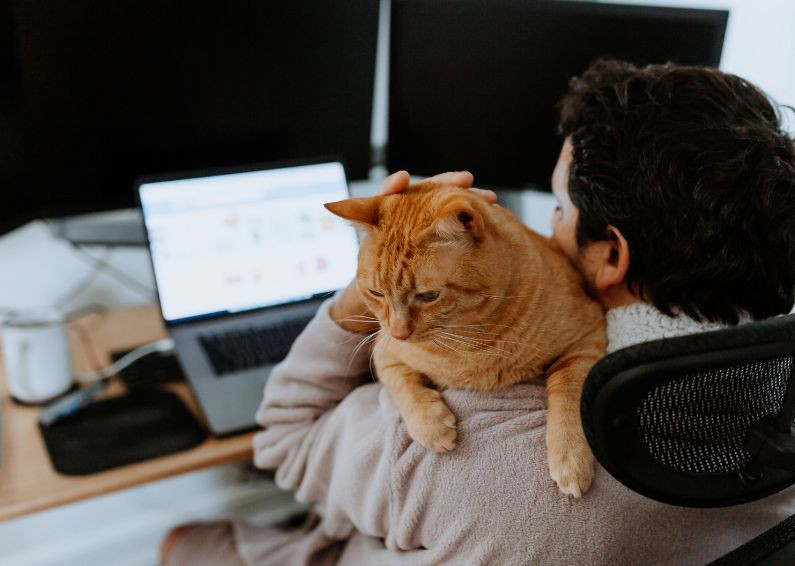
Is following you everywhere an indication of obsession? Yes, wanting to be in your company indicates they’re truly obsessed with you. If your cat follows you around the house, even to the bathroom, it is not some secret surveillance.
This behavior shows they always want to be in your company and is a sign of love in cat language. Cats follow the people they love as they want to be part of everything they do.
8. Bringing You Gifts

Is presenting gifts a way for cats to show love? Yes, leaving gifts is their unique way of saying they love you. Cats love bringing their favorite people gifts, whether it is their best toy, comforter, or some prey they have hunted.
It is their way of saying you are part of their family and they want you to be involved with something that brings them joy. They are sharing their prized possessions with you.
9. Purring a Lot
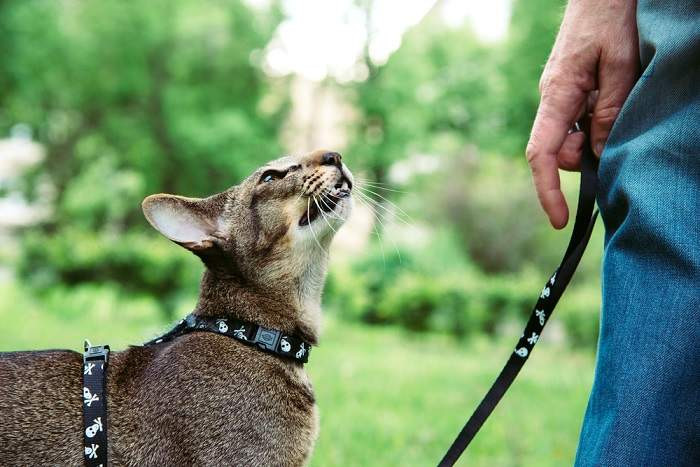
Does purring always mean happiness? Most often, yes. Purring while nuzzling you indicates contentment and pleasure in your company. Cats purr for many different reasons.
If your cat is purring and nuzzling into you when you are stroking them, you can be sure that this is a very content purr and they are pleased to be in your company. This is their way of letting you know they are very happy.
10. Showing You Their Belly
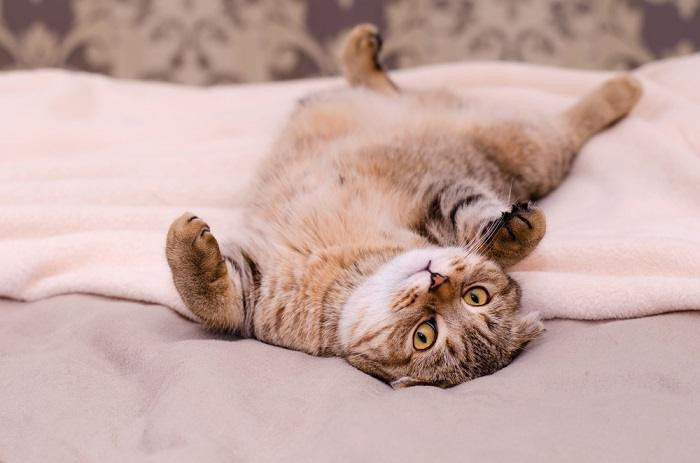
Is showing their belly a sign of trust? Absolutely! It means they trust you completely and feel safe around you. Cats have a universal code of showing vulnerability/submission, which is rolling into their backs and exposing their belly.
This behavior is due to the fact it is soft and lots of their vital organs are unprotected when they do this. If your cat trusts you and is completely relaxed in your company, they will do this, and might even allow you to rub or tickle their belly.
How to Handle Excessive Attention
1. Provide Engaging Toys and Playtime: Use interactive toys to keep your cat mentally stimulated.
2. Establish a Routine: Cats thrive on routine. Consistent feeding and playtimes can reduce anxiety-driven clinginess.
3. Gradual Independence: Gradually increase the time they spend alone to build their independence.
4. Safe Spaces: Ensure they have their own safe spots where they can retreat to feel secure.
Understanding Cat Behavior: A Journey with solcat.net
Cats are complex animals, and understanding their social interactions can be challenging. The team at solcat.net is dedicated to helping you interpret your cat’s behavior and build a stronger bond. Remember, every cat is unique, and their ways of showing affection may vary. A happy and content cat is one that feels loved and secure, so keep nurturing your relationship with your feline friend.
At solcat.net, located at 950 Alaskan Way, Seattle, WA 98104, United States, we are committed to providing you with the latest insights into cat behavior and care. You can reach us at +1 (206) 386-4000 or visit our website, solcat.net, for more information and resources.
Unlock the Secrets of Your Cat’s Affection at solcat.net!
Are you ready to delve deeper into the world of feline behavior? At solcat.net, we offer a wealth of resources to help you understand and strengthen your bond with your cat.
- Comprehensive Articles: Explore detailed guides on cat behavior, health, and care.
- Expert Advice: Access tips and insights from leading cat behaviorists and veterinarians.
- Community Forum: Connect with other cat lovers and share your experiences.
- Latest Research: Stay updated with the latest studies and findings in feline science.
Visit solcat.net today and embark on a journey to better understand your feline friend. Discover the joy of a deeper connection and provide the best possible care for your beloved cat.
Explore solcat.net Now!
Frequently Asked Questions (FAQs)
1. Do cats get obsessed with one person?
Yes, cats usually pick a favorite human in their household, typically the person who makes the most effort with them. This could be the one who feeds them regularly or gives them the best belly rubs. According to a study published in Behavioural Processes in July 2024, cats tend to form stronger attachments with individuals who consistently provide positive interactions, such as feeding, playing, and grooming.
2. Can cats tell that you love them?
Yes, cats understand affection just like other mammals. They have special ways of showing how much you mean to them and are good at recognizing when the feeling is mutual. A study from Cornell University’s Feline Health Center, in August 2025, indicated that cats respond positively to displays of affection from their owners, such as gentle petting and talking in a soft voice.
3. Why does my cat want to sit on me all the time?
If your cat wants to sit on you all the time, it is usually because they enjoy your company and are looking for a safe place, affection, and attention. Constant physical contact indicates they crave security and comfort from you. According to a report by the American Society for the Prevention of Cruelty to Animals (ASPCA) in September 2026, cats often seek out warm and comfortable spots, and their owner’s lap fits the bill perfectly.
4. Why is my cat being so clingy with me?
Cats can be clingy for many reasons, some good, some not so good. If there is a sudden change in their behavior, there might be something upsetting them or a stressor in their environment. These can include things like a new member of the family, health issues, separation anxiety, or even boredom.
5. How can I tell if my cat is stressed or anxious?
Signs of stress or anxiety in cats include excessive grooming, hiding, changes in appetite, increased vocalization, and avoidance of the litter box. If you notice these behaviors, consult with your veterinarian to rule out any underlying medical issues and discuss strategies for reducing stress in your cat’s environment.
6. What are some ways to enrich my cat’s environment and reduce boredom?
Environmental enrichment for cats includes providing scratching posts, climbing structures, interactive toys, and puzzle feeders. Rotating toys regularly can also help keep your cat interested and engaged. Additionally, ensuring they have access to sunny spots for lounging and safe outdoor enclosures for supervised exploration can enhance their overall well-being.
7. How important is playtime for cats?
Playtime is crucial for cats as it helps them exercise their natural hunting instincts, burn energy, and maintain a healthy weight. Regular play sessions can also strengthen the bond between you and your cat and prevent behavioral issues related to boredom and frustration.
8. What are some common signs of affection in cats?
Common signs of affection in cats include purring, rubbing against you, grooming you, slow blinking, kneading, following you around, and bringing you gifts. Understanding these behaviors can help you recognize and appreciate your cat’s unique ways of expressing love and companionship.
9. Should I be concerned if my cat suddenly stops showing affection?
If your cat suddenly stops showing affection, it is important to consider potential underlying causes such as illness, injury, stress, or changes in their environment. Schedule a visit with your veterinarian to rule out any medical issues and discuss any recent changes that may be affecting your cat’s behavior.
10. How can I build a stronger bond with my cat?
Building a stronger bond with your cat involves spending quality time together, providing consistent care and attention, engaging in interactive play sessions, and respecting their boundaries. Creating a safe and comfortable environment, offering positive reinforcement through treats and praise, and learning to understand their body language can also enhance your relationship.
